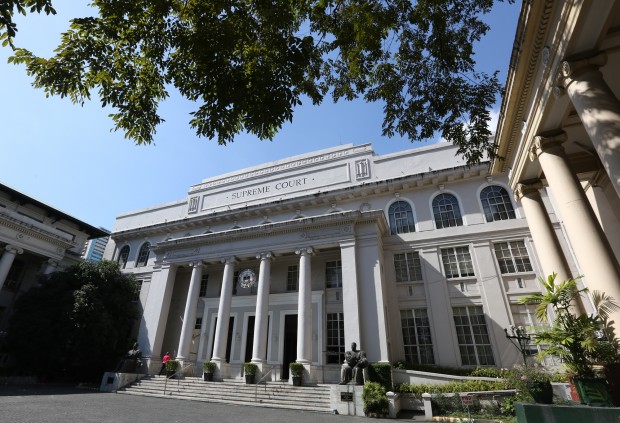The Supreme Court on Friday upheld the constitutionality of the Republic Act No. 9160 or the Anti-Money Laundering Act specifically the provision allowing the ex-parte application by the Anti-Money Laundering Council (AMLC) to inquire into and examine certain bank deposits and investments.
In a 41-page decision written by Associate Justice Jose Portugal Perez, the high court denied the petition filed by Subido Pagente Certeza Mendoza & Binay Law Firm (SPCMB) which sought to nullify Section 11 of Republic Act No. 9160.
Section 11 provides that “the AMLC may inquire into or examine any particular deposit or investment, including related accounts, with any banking institution or non-bank financial institution upon order of any competent court based on an ex parte application in cases of violations of this Act, when it has been established that there is probable cause that the deposits or investments, including related accounts involved, are related to an unlawful activity…which are punishable under the penal laws of other countries, and terrorism and conspiracy to commit terrorism…”
SPCMB is a law firm associated to the Binays. It was subject to an investigation by the AMLC after the former vice president was accused of involvement in anomalies during his stint as Makati mayor.
Binay’s daughter, incumbent Makati Mayor Abigail Binay, was a former partner at SPCMB.
In their petition, SPCMB argued that the ex-parte proceedings authorizing the inquiry of the AMLC into certain bank deposits and investments is unconstitutional, violating its right to due process and privacy.
The high court, in its ruling, however, said the provision does not violate substantive due process, there being no physical seizure of property involved at that stage.
“It is the preliminary and actual seizure of the bank deposits or investments in question which brings these within reach of the judicial process, specifically a determination that the seizure violated due process,” the high court said.
The high court added that there is nothing in Section 11 nor the implementing rules and regulations of the AMLC which prohibits the owner of the bank account, to ascertain from the Court of Appeals, post issuance of the bank inquiry order ex-parte, if his account is indeed the subject of an investigation.
“The owner of bank accounts that could be potentially affected has the right to challenge whether the requirements for issuance of the bank inquiry order were indeed complied with given that such has implications on its property rights. In this regard, SPCMB’s obeisance to promulgated rules on the matter could have afforded it a remedy, even post issuance of the bank inquiry order,” the high court said.
As a possible consequence of the violation of the SPCMB’s right to due process, the SC held “the information obtained through the account reverts to, and maintains its confidentiality. In short, any and all information obtained therein by AMLC remains confidential, as if no examination or inquiry on the bank account or investments was undertaken.” RAM
RELATED STORIES
